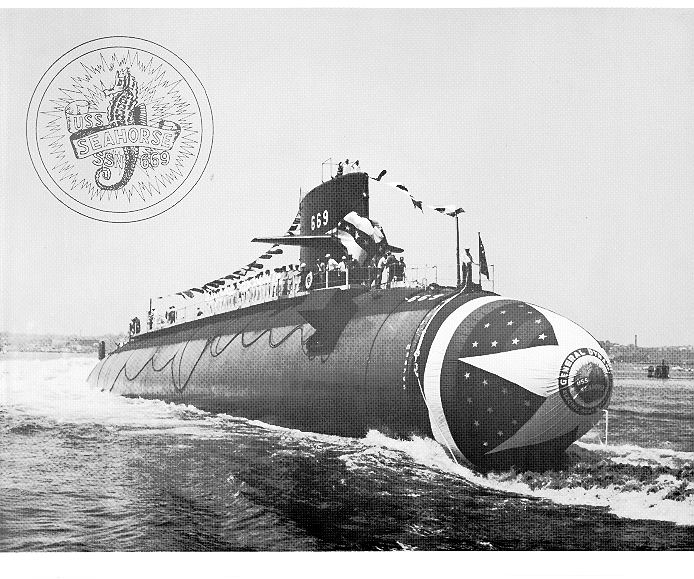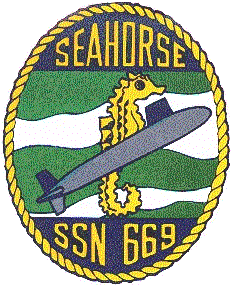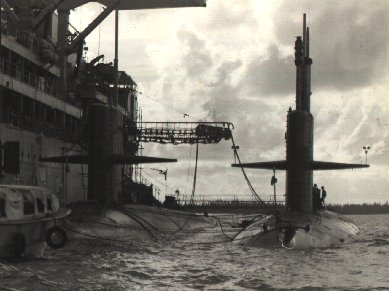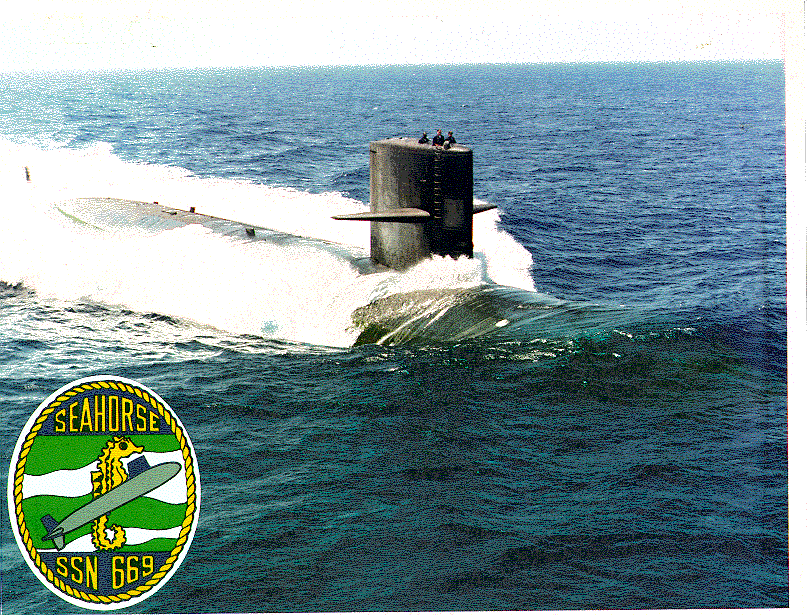




USS SEAHORSE SSN-669 was the Navy's
47th nuclear attack submarine at the time of her launching. She was sponsored by Mrs. Paul
Ignatius, wife of the Secretary of the Navy. The commissioning ceremony took place on 19
September 1969 with CDR George Harper Jr. in command. Following a caribbean
On 30 November 1970, Seahorse got underway from Charleston on her first major
deployment. She operated in the Atlantic and visited Bremerhaven, Germany before returning
home. Seahorse again departed Charleston on 21 June 1971 for an extended Mediterranean
deployment, for which she was awarded her first Meritorious Unit Commendation.
 On 9
February 1972, Seahorse departed on her third major deployment in 14 months. This time she
visited Faslane, Scotland before returning to Charleston on 11 May 1972. In September 1972
Seahorse once again left for the North Atlantic to participate in NATO exercise
"Strong Express" followed by exercises with Great Britain, the Netherlands, and
Canada. On 25 October 1973, she got underway on less than one days notice and deployed to
the Mediterranean in support of US Forces in the Middle East crisis (editor's note: based
upon conversations with crew members who participated...I believe they referred to this as
the "we only had time to pack one pair of underwear" cruise). She remained at
sea until 11 December 1973 with the exception of two stops, each less than one day in
duration. While in the Mediterranean, CDR Nathan Heuberger relieved CDR William Ratliff
who had been in command since September 1970. Seahorse returned to Charleston and entered
the Charleston Naval shipyard in February 1974 (editor's note: the underwear walked off
the boat on their own).
On 9
February 1972, Seahorse departed on her third major deployment in 14 months. This time she
visited Faslane, Scotland before returning to Charleston on 11 May 1972. In September 1972
Seahorse once again left for the North Atlantic to participate in NATO exercise
"Strong Express" followed by exercises with Great Britain, the Netherlands, and
Canada. On 25 October 1973, she got underway on less than one days notice and deployed to
the Mediterranean in support of US Forces in the Middle East crisis (editor's note: based
upon conversations with crew members who participated...I believe they referred to this as
the "we only had time to pack one pair of underwear" cruise). She remained at
sea until 11 December 1973 with the exception of two stops, each less than one day in
duration. While in the Mediterranean, CDR Nathan Heuberger relieved CDR William Ratliff
who had been in command since September 1970. Seahorse returned to Charleston and entered
the Charleston Naval shipyard in February 1974 (editor's note: the underwear walked off
the boat on their own).
 From
16 August till 26 September 1975, Seahorse was underway in company with the USS Nimitz and
USS South Carolina as a unit of Navy Nuclear Task Group '75. Port calls were made in
Germany, Scotland, and England. In 1976, she again deployed to the Northern Atlantic for
three months. On 30 November 1976, Seahorse left Charleston for another Mediterranean
deployment and returned 11 May 1976. On 22 January 1977, CDR Henry McKinney assumed
command. Seahorse spent all of 1978 undergoing a refueling overall. In 1980, she deployed
to the North Atlantic and the Mediterranean for 5 months with CDR Joseph Sharpe Jr.
relieving as commanding officer in June 1980.
From
16 August till 26 September 1975, Seahorse was underway in company with the USS Nimitz and
USS South Carolina as a unit of Navy Nuclear Task Group '75. Port calls were made in
Germany, Scotland, and England. In 1976, she again deployed to the Northern Atlantic for
three months. On 30 November 1976, Seahorse left Charleston for another Mediterranean
deployment and returned 11 May 1976. On 22 January 1977, CDR Henry McKinney assumed
command. Seahorse spent all of 1978 undergoing a refueling overall. In 1980, she deployed
to the North Atlantic and the Mediterranean for 5 months with CDR Joseph Sharpe Jr.
relieving as commanding officer in June 1980.
 In July 1981, Seahorse participated in READEX 2-81, a Second Fleet exercise. She got
underway for an extended overseas deployment to the Indian Ocean in October 1981. After a
46,000 mile, six month around the world voyage through five of the world's seven oceans,
she returned to Charleston on 19 April 1982, completing a 181 day deployment. Also, during
1982, Seahorse participated in several NATO Anti-Submarine Warfare exercises in the North
Atlantic.
In July 1981, Seahorse participated in READEX 2-81, a Second Fleet exercise. She got
underway for an extended overseas deployment to the Indian Ocean in October 1981. After a
46,000 mile, six month around the world voyage through five of the world's seven oceans,
she returned to Charleston on 19 April 1982, completing a 181 day deployment. Also, during
1982, Seahorse participated in several NATO Anti-Submarine Warfare exercises in the North
Atlantic.
Seahorse began 1985 deployed north of the Arctic Circle. Following a return to home port,
Captain Jasper Johnston Jr. was relieved by CDR Winn Harding on 11 April 1985. Seahorse
again deployed to the North Atlantic from August till late October 1985. In July 1986, she
deployed to the Arctic and surfaced at the North Pole. She completed her second transit
through the Panama Canal and reported to Bremerton, Washington for overhaul where she
remained from February 1987 to March 1989. CDR Paul Taylor assumed command in August 1987.
 In June
1989, Seahorse returned to her home port and conducted local area operations for the
remained of the year (editor's translation: played cat and mouse with the
"ruskies"). From April to June 1990, she deployed on operation ICEX to the North
Pole. On 22 June 1990, CDR James Alley relieved CDR Taylor. The remainder of the year the
ship conducted local area operations. During 1991, Seahorse was awarded another
Meritorious Unit Commendation for operations in which she surfaced again at the North
Pole, deployed to the Northern Atlantic, and then the Mediterranean. In 1992, Seahorse
participated in local operations. In October 1992, she participated in a Mediterranean
deployment until April 1993. In January 1993, Seahorse was awarded the Battle Efficiency
"E".
In June
1989, Seahorse returned to her home port and conducted local area operations for the
remained of the year (editor's translation: played cat and mouse with the
"ruskies"). From April to June 1990, she deployed on operation ICEX to the North
Pole. On 22 June 1990, CDR James Alley relieved CDR Taylor. The remainder of the year the
ship conducted local area operations. During 1991, Seahorse was awarded another
Meritorious Unit Commendation for operations in which she surfaced again at the North
Pole, deployed to the Northern Atlantic, and then the Mediterranean. In 1992, Seahorse
participated in local operations. In October 1992, she participated in a Mediterranean
deployment until April 1993. In January 1993, Seahorse was awarded the Battle Efficiency
"E".
On 30 April 1993, CDR Richard Current relieved CDR Alley. For the remainder of 1993,
Seahorse conducted local area operations. During her final year of service, she deployed
as the submarine element in UNITAS XXXV-94, a five month circumnavigation of South
America, for training and good will among our southern hemispheric neighbors. She
completed her fourth Panama Canal transit returning to Charleston in December 1994.
 Seahorse was deactivated on 6 January 1995 in Charleston. She made one more trip through
the Panama Canal on her way to San Diego for DSRV (Mystic) operations. Her final official
duty was to act as the guard ship for the sea trials of the Los Angeles on her way to
Bremerton. She entered Bremerton Shipyard in February 1995. Her systems were deactivated
and her core removed. She was decommissioned on Aug 25th, 1995. During her 25 years of
service, Seahorse sailed more than 736,500 miles, dived 1,117 times (and surfaced 1,117
times!), and passed through the Panama Canal five times. She was awarded one Navy Unit
Commendation, three Meritorious Unit Commendations, and two Battle Efficiency
"E"s.
Seahorse was deactivated on 6 January 1995 in Charleston. She made one more trip through
the Panama Canal on her way to San Diego for DSRV (Mystic) operations. Her final official
duty was to act as the guard ship for the sea trials of the Los Angeles on her way to
Bremerton. She entered Bremerton Shipyard in February 1995. Her systems were deactivated
and her core removed. She was decommissioned on Aug 25th, 1995. During her 25 years of
service, Seahorse sailed more than 736,500 miles, dived 1,117 times (and surfaced 1,117
times!), and passed through the Panama Canal five times. She was awarded one Navy Unit
Commendation, three Meritorious Unit Commendations, and two Battle Efficiency
"E"s.
SSN-669 Specifications
Length(ft-in) - 292-0
Beam(ft-on) - 32-0
Maximum Depth - > 400
Surface displacement(tons) - 4,060
Maximum speed(kt) - > 20
Complement: 15 officers and 126 enlisted at deactivation